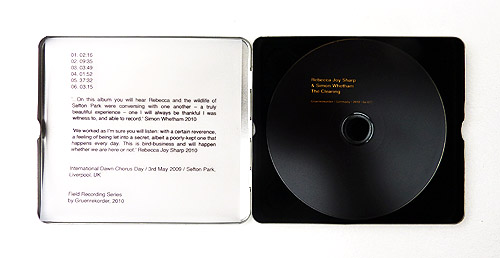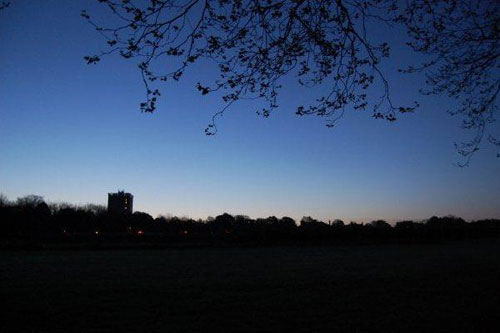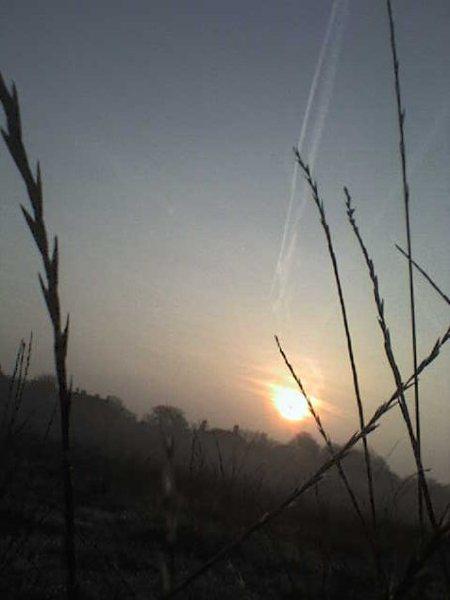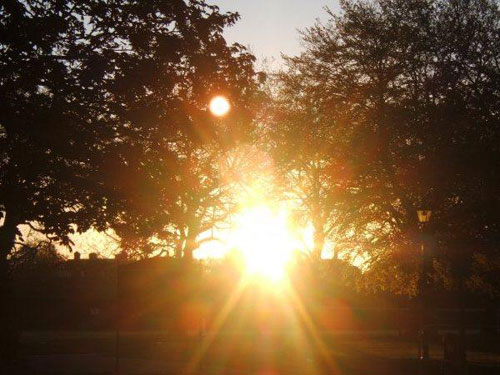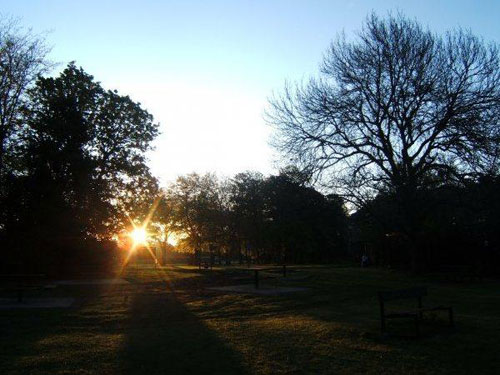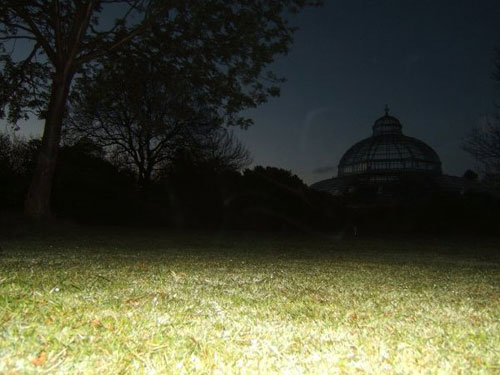
The Clearing | Rebecca Joy Sharp & Simon Whetham
Gr 077 | Gruen CD-R | Silver > [Sold Out]
MP3 & FLAC > [order]
01. 02:16
02. 09:35
MP3
03. 03:49
04. 01:52
05. 37:32
06. 03:15
6 Tracks (57′39″)
CD-R (50 copies)
Simon Whetham:
In early 2009, Rebecca Sharp kindly invited me to work with her and record her playing harp in an outdoor setting. She proposed a recording session during daybreak on International Dawn Chorus Day, where she would improvise with the birdsong as the sun rose.
We met at 03:45 and took the harp and recording equipment to a central point of the park. The weather was against us and rain was falling as we set up. Rebecca carried on as best she could under the conditions, playing when the rain eased up, as I moved around, finding positions that captured both the harp and all the other sonorous activities of the park, until after two hours, cold and damp, we called it a day.
We met later the same day and discussed the session. We decided to embark on the same mission the following day, hoping the weather would be a little better…
At 4am on 4th May we set up in the same spot. It was cloudy but dry, and a combination of being more prepared, listening more closely to the individual birds and feeling more relaxed led to an incredibly rich session. The harp sounds fantastic!
On this album you will hear Rebecca and the wildlife of Sefton Park were conversing with one another – a truly beautiful experience – one I will always be thankful I was witness to, and able to record.
Rebecca Joy Sharp:
I had suggested to Simon that we might use a piece of mine called The Clearing, a fairly ambient piece that I wrote a few years ago (in fact, a homage to John Martyn’s Small Hours), that had never quite found a home in anything else I’d done. It ended up being the only composed (musical) element we used; any other tunes I played felt intrusive and arbitrary and were quickly abandoned in favour of abstract improvisation.
At times I find the recurring glimpses of The Clearing to be reassuringly formal, familiar. Other times, I hear them as a reminder of my own absurd need in the beginning to impose elements to something that is already beautiful and in essence untouchable; over which I can never, must never have any affect. For me, the presence of The Clearing (and indeed the project as a whole) toys with several such delicate tensions, between things I know next to nothing about – ornithology, botany, this time of the morning – and the desire to abandon knowledge, temporarily at least. It also perhaps creates an aural equivalent of its physical counterpart – a meeting point, a place for resolution.
I enjoy the occasional falters, hesitancies from cold hands, a buzzy string. A major arpeggio is as surprising when it comes, as an unidentifiable rustling sound. The clunk of my tuning key slotting onto the peg (the harp waking up) provides context and a reminder of the machinery involved; my own agency, a few necessary decisions. We are also reminded that this dawn chorus includes a fox-fight, distant traffic and shouting. This is due in no small part to Simon’s expertise and I am immensely grateful to have been able to realise this project with him.
We worked as I’m sure you will listen: with a certain reverence, a feeling of being let into a secret, albeit a poorly-kept one that happens every day. This is bird-business and will happen whether we are here or not.
International Dawn Chorus Day / 3rd May 2009 / Sefton Park, Liverpool, UK
Field Recording Series by Gruenrekorder
Gruenrekorder / Germany / 2010 / Gr 077 / LC 09488
Nausika | The Sound Projector
The Clearing: gentle, meditative music that can be uplifting and joyful
A very pleasant and relaxing recording of Rebecca Joy Sharp playing her Celtic harp in Sefton Park in Liverpool – that’s Liverpool in the UK, not Liverpool in Sydney, Australia, which happens to be a few train-station stops from Sefton! – surrounded by a chorus of birds that engage in a call-and-response conversation with the musician. Sharp’s approach is to be very minimal and spontaneous and to allow the birds and other creatures in the park plenty of opportunity to respond to and comment on her disarmingly simple, almost koto-like plucking. While she was playing, Simon Whetham set up microphones around her to capture the sounds of the harp, the animals in the park and the sounds of the city around the park as well. In the distance, the squawking of seagulls and the rumble of the sea can just be heard. Remarkably few traffic noises can be heard but Sharp was performing very early in the morning before dawn.
Sharp does not play any melodies except in track 5: nearly all her notes are played in response to the birds’ singing and so her harp blends in with the noises the creatures make. The whole recording sounds very New Agey but without the cliches associated with New Age music – you know, the faked warmth and overdone soothing trance synth music layered over (or drowning out) what passes for “tropical bird” noises. There is one amusing moment during the CD where a couple of foxes start squabbling and scrap with each other. Near the end of the recording, there’s a brief rain shower which, though it must have been unpleasant for Sharp and Whetham, actually closes off the music like an ambient silvery curtain.
Admittedly this music is not my shot of speed-juice and it seems more appropriate for a music library patronised by DJs and record producers wanting some spring-time ambience for a recording. There may be TSP readers who want some pleasant meditative music that’s not actually billed as music for meditation or for solitude, and this recording will be just right for those people: it’s gentle and quite emotional in parts, and if you allow yourself to melt into the recording, you are certain to find parts of it very uplifting and joyful.
Dan Warburton | Paris Transatlantic Magazine
Mention Liverpool and you’re more likely to think of „Ferry Across The Mersey“ or Jamie Bulger or the Anfield kop or the Toxteth Riots or Echo and the Bunnymen or Cilla Black or Derek Hatton or Boys from the Blackstuff or, umm, what were those four guys called in the 60s? than a pastoral scene of a harp (of all instruments) playing along with the dawn chorus, but that’s exactly what The Clearing is. Recorded in the city’s Sefton Park on May 4th last year (originally the plan was to do it the day before, which was International Dawn Chorus Day, but inclement weather postponed the adventure – one can only conclude God is a scouser with Ken Dodd’s sense of humour.. „how tickled I am“), it’s a delightful and intimate affair, with Whetham’s microphones catching not only every tiny inflection of Sharp’s harp playing (love the occasional bent notes, which lend the instrument a koto-like quality) but all manner of rustles and flutters from the undergrowth, not to mention the distant rumble of the awakening city. Eventually the rain does set in – one assumes that Sharp, for the sake of her instrument, was playing in some kind of makeshift tent – but not before a couple of foxes have had a fight and squawking gulls have reminded us that the sea is never too far away. What Sharp plays is unashamedly tonal, even the way she tunes up on track four – The Clearing was written as a homage to John Martyn’s „Small Hours“, another idyllic open-air recording of note on 1977’s One World – and wouldn’t, I suppose, be out of place in the new age bin along with the whale songs, but don’t let that put you off. You may well find yourself listening, as she puts it nicely, „with a certain reverence, a feeling of being let into a secret, albeit a poorly-kept one that happens every day. This is bird-business and will happen whether we are here or not.“–DW
Oreshkin Sergey | maeror3.livejournal
Приятно, когда увлечение музыкой помогает не только заполнить полки и прочее жизненное пространство коробочками с дисками, но еще и как-то расширить свой кругозор, узнать о чем-то новом. Свежий релиз лейбла «Gruenrekorder» (CD-R в стильной металлической коробке, ограниченный тиражом в 50 штук) поведал мне о мероприятии, которое называется «International Dawn Chorus Day», по нашему что-то вроде «Всемирный день Рассветной Песни». В первое воскресенье мая каждого года многие люди по всему миру просыпаются еще до рассвета и идут в городские парки или близлежащие леса, чтобы прослушать пение пробуждающихся птиц, вдохнуть свежий воздух и почувствовать свое единство с окружающим миром, который в такие замечательные минуты кажется не таким уж и плохим местом. Ребекка Джой Шарп и Саймон Вэдем предприняли вылазку на лоно природы (Сэфтон Парк, Ливерпуль) третьего мая 2009 года, причем дама захватила с собой арфу (надо думать, какую-нибудь «ручную» модификацию этого громоздкого инструмента), а ее спутник вооружился микрофоном и записывающей аппаратурой.
Прослушивание этого альбома серым осенним днем вызывает жалость и зависть – жалость, в первую очередь к себе, а зависть понятно к кому. Потому что птицы улетели, до весны еще куча не самого теплого времени, а так хочется оказаться в этом самом Сэфтон Парке, или хотя бы в ближайшем Подмосковье и послушать птиц, подставив лицо свежему ветерку или даже порывистому дождю, который налетел на отдыхающих в пятой безымянной композиции этого диска. «The Clearing» в своей некуда не спешащей расслабленности мало чем отличается от бесконечных сборников «Музыка на фоне звуков природы для усталого офисного работника», но это его не портит. Поют птицы, шумит ветерок, доносятся голоса людей, кажется, даже трава шелестит под ногами, оживляя необозримо огромное поле своим движением – настолько идеально при помощи звуков воссоздана панорама местности, выписал звуковой пейзаж, в котором существуют еще и неторопливые, прозрачные переливы арфы, не оформленные в привычные мелодии легкие касания струн, вибрации которых также что-то задевают внутри. Приятная и позитивная во всех отношениях запись, устанавливающая в душе столь необходимый баланс и поддерживающая заряд тепла и света. 5/5
Brian Olewnick | Just outside
„Disarming“ is a word that comes to mind, perhaps. A simple enough idea, elegantly manifested–record a harpist out in the environment, in this case bird-filled. The dangers are obvious and, I must say, my expectations were somewhat along Rhodri Davies lines as far as the likely music was concerned so that when I heard the decidedly melodic content and „standard“ technique employed, I feared that the result would be overly cloying. I might say that it comes close to that sometimes but by and large, skirts that particular danger and ends up as a very enjoyable release. This is largely due to the reticence of Rebecca Joy Sharp (how many performer’s surnames contain their chosen instrument?) as she, for the most part, leaves no greater a soundprint than the area birds (which make up the majority of the natural sounds). She plays delicate, tonal patterns–at times recalling Tilbury at his softest and most melodic, generally with a ruminative feel, advancing and receding in the flux. With one exception, her work seems to have been improvised, not imitating birdsong but attempting to blend in with it, just another bird. The exception is the fifth track where she plays a simple but lovely theme (her own, I expect, though I’m not sure), that reminded me a bit of the sort of thing Jarrett and Haden occasionally created in the mid 70s, as on the title track of „Death and the Flower“. It’s quite nakedly emotional, all the more enhanced when a strong rain shower breaks out toward the end. Some listeners, particularly hard core eai folk, might find it fey or faux naive but it won me over, softy geezer that I am.
A lovely recording.
Ron Schepper | textura
A new installment in Gruenrekorder’s Field Recording Series, The Clearing is an hour-long document recorded by Simon Whetham of Rebecca Joy Sharp playing harp surrounded by sounds of wildlife at Liverpool’s Sefton Park. The recording session began at daybreak on May 3rd, 2009 (also International Dawn Chorus Day) with the two meeting at 3:45 in the morning and recording for two hours at the center of the park. Rain complications forced the session to be cut short (the album’s shortest piece appears to capture Sharp tuning up against a crackling backdrop of rain) so the two reconvened the next day at the same time and place, with the weather more cooperative the second time around.
The album is so titled because during one part of the album Sharp performs a lovely serenade called “The Clearing” that she composed as an homage to John Martyn’s “Small Hours” (in this case too rain gradually enters the picture and swells in intensity). Aside from that through-composed setting, however, much of her playing feels improvised, as if she’s simply responding in the moment to the sounds appearing around her. In essence, then, the album documents Sharp conversing, so to speak, with the wildlife and the setting. Rather than filling every moment with her playing, she often plays a phrase, sometimes even hesitantly, and then lays out, allowing the plenitude of natural sounds—bird chirps, sea gull and crow cries, the rustle of ambient noise, and the distant thrum of traffic—to occupy the space; faint traces of people shouting also surface during the thirty-eight-minute track, the longest of the album’s six, and apparently a fox fight transpired while the tape rolled too. The bright tinkle of the harp’s strums and arpeggios clearly stands forth from the dense surround, and there are moments when Sharp and the park’s birds appear to indulge in the kind of call-and-response that one typically associates with improvising jazz musicians.
The result is about as bucolic and calming as one might expect, given the nature of the project, and with one’s eyes closed one is easily able to transport oneself to the setting and visualize Sharp strumming her harp at the park’s center enveloped by a wealth of natural (and non-natural) sounds.
Frans de Waard | VITAL WEEKLY
‚On this album you will Rebecca (Joy Sharp) and the wildlife of Sefton Park were conversing with one another – a truly beautiful experience – one I will always be thankful I was witness to, and able to record‘, writes Simon Wetham on the cover of this release. So just what did Whetham do here? Setting up a bunch of microphones (or perhaps even one?) and watch Sharp play the lever, which is a Celtic harp. It was recorded at the International Dawn Chorus day – 3rd of May 2009 of which I never heard, but the dawn chorus is captured beautifully here. The birds sing great and Sharp’s harp sings nicely in the morning light. I heard this release already a few days ago, but now that I am hearing it again its indeed more ‚morning‘ like, although not really dawn anymore, and sunlight bursts in (but its too cold to open the window) and the music is the gentle harp and singing of birds. It almost feels like spring time, my favorite season of all (although this cold October morning looks good too). And Whetham? What did he do? He captured the whole thing in a beautiful way. A great achievement. (FdW)
